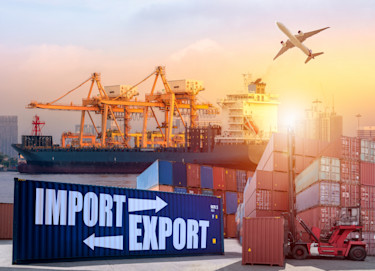Our research
Access all our publications and columns. Use the filters to easily find what content you are looking for.
Filters
All publications
1849 results
Top of Mind - Out with the old tariffs, in with the new
- Macro economy
-
After a surprisingly long delay, the Supreme Court ruled 6-3 last Friday that the International Emergency Economic Powers Act (IEEPA) does not give the President the authority to impose tariffs. Importantly, they referred the decision on whether paid tariffs, over $160 billion, have to be refunded back to lower courts. The Trump administration was quick to reimpose tariffs through other means. Still, overall tariff levels were somewhat reduced, with some countries benefiting substantially more than others.

Key Macro Events 23-27 February
- Macro economy
-
These are the Key Macro Events for the upcoming week.

The changing of the guard at the ECB
- Macro economy
-
The Financial Times reported this morning that ECB President Christine Lagarde will leave her post before her term expires in October 2027. The reported reason is that she wants to exit before the French presidential election in April of next year, which would allow French President Macron - together with German Chancellor Merz - to be in the driver’s seat when it comes to selecting a new ECB President. The ECB did not fully deny the story, but responded by saying that Lagarde had ‘not taken any decision’.

Kevin Warsh’s Reverse Operation Twist
- Macro economy
-
The Trump administration would like to see long-term interest going down yet oddly Warsh’s vision of the Fed appears to imply the opposite. There is a trinity of steepening policies, though in this note we focus on his policy to rein in the footprint of the central bank’s balance sheet. Shrinking the balance sheet would need the Fed to go back to a scarce reserves policy, which would make it more difficult to set interest rates. More likely is for it to reduce the skew of its Treasury holdings towards longer-term securities to market-neutral in a Reverse Operation Twist. The Fed’s Operation Twist in 2011-2012 flattened the curve and lowered the term premium and this would likely have the opposite impact. The US Treasury could alter its issuance policy, in effect conducting its own Operation Twist as part of a 2026 Fed-Treasury accord. The rising funding needs of the US government could still make these shifts challenging, meaning they are more likely to be gradual.

Key Macro Events 16 – 21 February 2026
- Macro economy
-
These are the Key Macro Events for the upcoming week.

ESG Economist - Renewables are at crossroads
- Sustainability
-
Costs for onshore wind and solar PV have significantly decreased over the past decade but have stabilized recently, while CCS, battery storage, and hydrogen remain relatively expensive. Grid congestion, curtailment, and lower capture prices are becoming key bottlenecks. Batteries are essential for addressing grid constraints and renewable intermittency, enabling energy storage, grid stability, and improved project economics. Oversupply in battery production has resulted in significantly lower prices, but as demand and material prices rise, upward pressure on prices may emerge. The focus is moving from renewable capacity expansion to system integration, requiring investments in storage, grids, and flexible infrastructure for a resilient energy system.

Key Macro Events 9 – 13 February 2026
- Macro economy
-
These are the Key Macro Events for the upcoming week.

Euro not yet an issue for the ECB
- Macro economy
-
The ECB has been saying for months that interest rates are in a good place, and today it repeated this message following its Governing Council meeting.

ESG Economist - Netherlands' emissions gap towards 2030 is growing despite progress
- Sustainability
-
The Netherlands is decarbonising, and the transition is in full swing. However, the pace of the transition to a low-carbon economy is not yet sufficient to achieve the climate targets that have been set. This analysis highlights the shortfall and examines the reasons behind it. Among other things, we see that there are numerous initiatives to decarbonise and that many best practices can now be identified. However, the sectors responsible for the largest share of greenhouse gas emissions – the energy-intensive sectors covered by the EU Emissions Trading System (EU ETS) – still face a major challenge in becoming low-carbon. For many companies in these sectors, decarbonisation solutions are often within reach, but it is the preconditions that often create obstacles. In this analysis, we first examine the trend of a number of sustainability indicators for the Dutch economy and the current state in reducing greenhouse gases (GHG) in various sectors. In doing so, we look at, among other things, the feasibility of the 2030 climate target per sector. We then take a closer look at the portion of emissions covered by the EU ETS and how energy-intensive sectors in industry are performing. Specific industrial climate targets are discussed, including the most obvious decarbonisation options. We end this analysis with a conclusion.

Global manufacturing shrugs off geopolitics
- Macro economy
-
Global manufacturing PMI improved in January despite flaring-up of geopolitical tensions. After having coming down somewhat in the last few months of 2025, the global manufacturing PMI started 2026 on a bit stronger note, moving back up by 0.4 points to 50.9 in January. This implies that according to this survey, global manufacturing stayed in expansion mode for the sixth consecutive month, following some US tariff-related weakness in mid-2025. The improvement in January was clearly led by developed markets (DMs), for which the aggregate index rose by almost a full point to 51.4, the highest reading since June 2022. The aggregate for emerging markets (EMs) also improved, but only marginally, to a three-month high of 50.6.
